Discover the top 6 digital marketing skills you need to land high-paying jobs in 2025. Stand out and boost your career today.

I didn’t get into digital marketing because it sounded cool. I got into it because I was tired of sending out job applications and getting ignored. I wanted something that actually paid well and didn’t need me to spend four years and a mountain of debt to get started.
Turns out, businesses aren’t just hiring digital marketers. They’re competing for them.
Why? Because companies today live and die by what happens online. If no one’s finding them, clicking, buying, or signing up, they’re stuck. And they know it. So when they find someone who can bring traffic, turn visitors into leads, and drive sales? They don’t blink at the paycheck.
Glassdoor reports the average salary for digital marketers in the US is around $76,000. That includes junior roles. More specialized positions like paid ads, SEO, or CRO (Conversion Rate Optimization) go north of six figures. And if you freelance or run your own thing, there’s no cap.
LinkedIn’s 2024 Jobs on the Rise report lists digital marketing roles among the top-growing jobs in the country. Demand is strong across industries. Healthcare, finance, tech, real estate…you name it. Everyone’s online now, and they all need people who can help them win attention and turn it into results.
But here’s the thing. Knowing how to post on Instagram or write a blog isn’t enough anymore. The game’s moved. Companies want people with skills that tie directly to growth. Not vanity metrics. Not busywork. Revenue. ROI. Real outcomes.
In this list, I’ll break down five digital marketing skills that actually matter. These are not optional. These are the skills that make you valuable. Learn them, use them, and you’ll never worry about finding a job. You’ll be the one choosing which offer makes the most sense.
Let’s get into it.
Key Takeaways
- High-paying digital marketing jobs go to people with proven skills, not just degrees. Companies care more about what you can do than what’s on your resume.
- SEO, content marketing, and PPC are still core to any digital strategy. If you can drive traffic and conversions, you’re valuable. Simple as that.
- Understanding data and analytics is a non-negotiable skill. Knowing how to track and explain results makes you look sharp and trustworthy.
- Email marketing and automation still deliver some of the best ROI. If you can write, segment, and automate smart email flows, you’re ahead of the game.
- Digital marketing keeps changing, so constant upskilling is a must. Stay current with courses, tools, and real-world practice to stay relevant and competitive.
- These in-demand digital marketing skills are what separate top earners from the rest. Learn them, show results, and the high-paying roles will follow.
Why Digital Marketing Skills Matter for High-Paying Roles
Digital marketing is not just another career option. It is a fast-growing industry with real money behind it. The global digital advertising market is expected to hit over $650 billion by 2028, according to Statista. That growth means companies need marketers who can deliver results, not just follow trends.
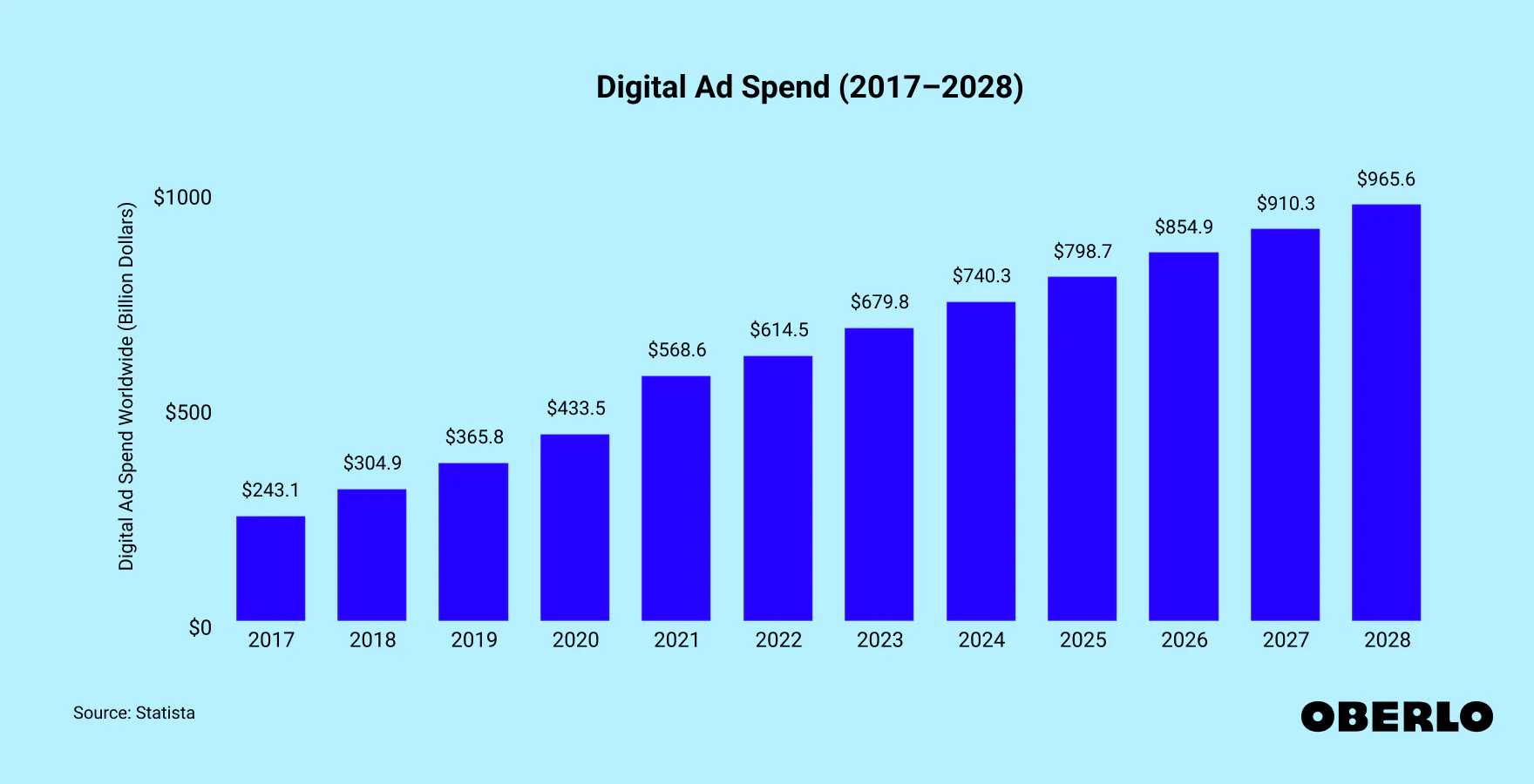
Degrees alone do not cut it anymore. Employers want people who know how to run profitable ad campaigns, grow email lists, write copy that converts, and track what is working. If you can prove you have the skills, the job is yours no matter your background.
According to LinkedIn’s 2024 data, digital marketing skills like SEO, content strategy, paid media, and analytics are among the most in demand. These skills are now considered core business drivers, not just support roles.
The best part? This field rewards people who keep learning. You can start small and work your way into specialized roles like email marketing strategist, PPC manager, or CRO expert. Upskilling is the name of the game. Most roles also offer remote work options, contract freedom, and flexible income paths.
If you want a career with solid growth, real freedom, and high earning potential, this is it. The market is wide open but only for those who bring real skills to the table.
Top 6 Digital Marketing Skills to Learn
If you want to land a high-paying role in digital marketing, you need more than surface-level knowledge. You need skills that drive growth, solve real business problems, and show you understand how online marketing works from the ground up.
These five are non-negotiable.
1. SEO Skills (Search Engine Optimization)

SEO is still one of the most valuable skills in digital marketing. Why? Because organic traffic is free, consistent, and usually high intent. If you can rank content on search engines, you become a long-term asset to any business.
According to BrightEdge, over 68 percent of online experiences start with a search engine. And SEO drives over 1,000 percent more traffic than organic social media. That’s not small. That’s massive.
Most companies know SEO matters, but very few do it well. That’s where skilled digital marketers come in.
You do not need to master everything on day one, but you should know the difference between on-page, off-page, and technical SEO. Understand how Google ranks content. Learn to do keyword research, optimize content, build internal links, and track performance.
Advanced SEO can go deeper with things like schema markup, site audits, and backlink strategies. But the basics alone can get you hired if you know how to apply them.
Some tools worth learning:
- Google Search Console (for tracking site performance)
- Ahrefs or Ubersuggest (for keyword research and backlink audits)
- Screaming Frog (for technical audits)
- Surfer SEO or Clearscope (for content optimization)
SEO skills for digital marketers are not just “nice to have.” They’re one of the first things hiring managers look for. If you can prove you know how to bring in organic traffic, you’re already ahead of the pack.
2. Content Marketing Skills
Content is the engine behind everything in digital marketing. It is what drives traffic, builds trust, educates buyers, and sets brands apart. If you know how to create content that speaks to people and moves them to act, you are not just a marketer then you are a revenue driver.
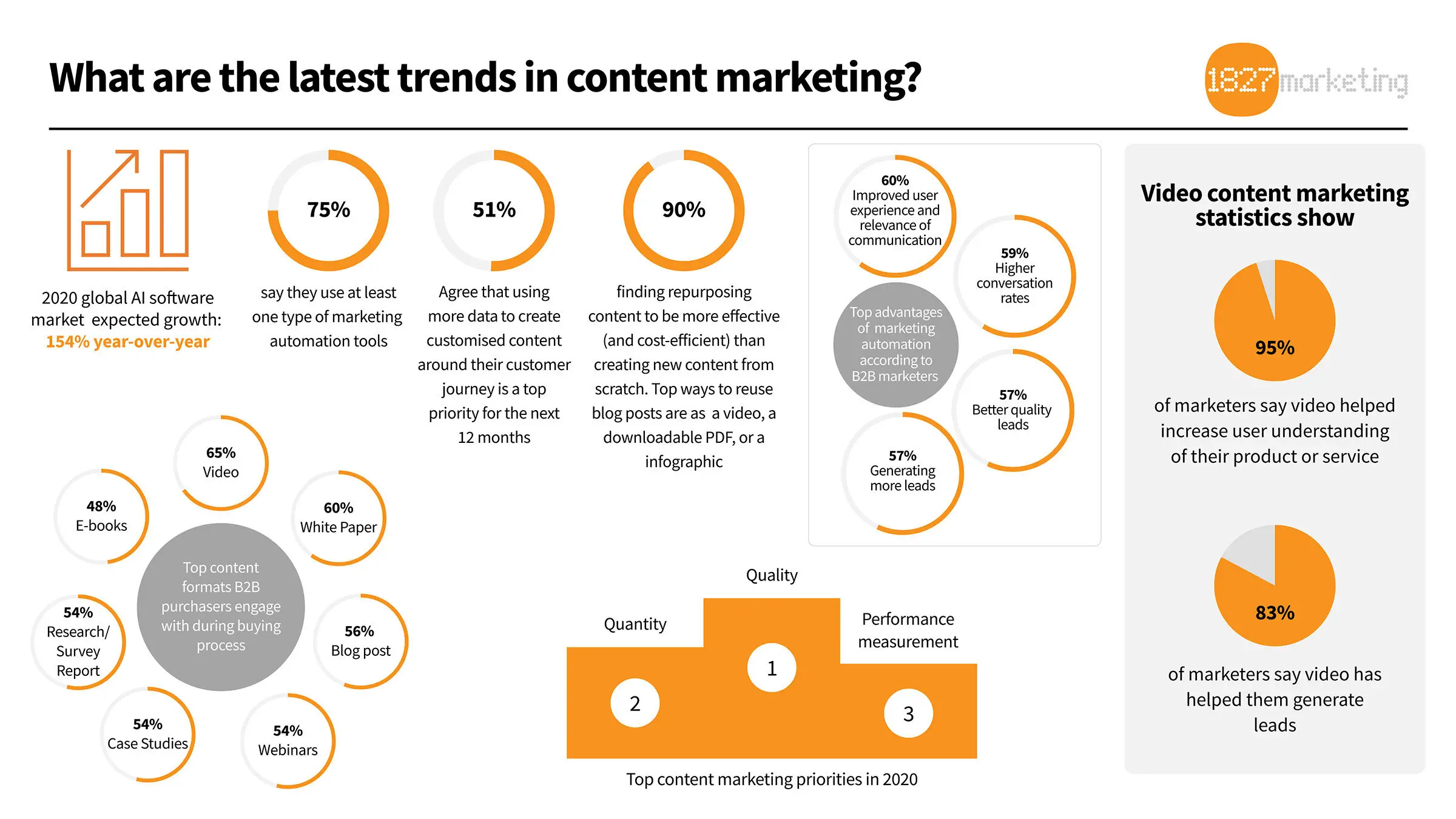
This goes way beyond just posting on a blog or making videos. Content marketing is about strategy, structure, and results. You are building content that serves a real business goal, bringing in leads, converting buyers, or nurturing existing customers.
According to HubSpot’s State of Marketing Report, 70 percent of marketers are now investing in content marketing. The same report says businesses that blog consistently see 55 percent more traffic and generate 67 percent more leads compared to those that do not. That is a big difference.
But here is what separates beginners from pros: Good content is not just information. It is storytelling backed by strategy. You are not just writing words. You are solving problems, answering questions, and guiding people through a journey.
For example, a long-form blog post that explains a product in detail can drive search traffic and help with SEO. A video that shows how to use the product builds confidence. A downloadable guide can turn that interest into a lead. Each piece plays a role.
If you can create blog posts that rank, videos that get watched, or case studies that prove value, you become a core part of the business. Especially if you understand how to use analytics to improve performance over time.
To build strong content marketing skills, learn how to:
- Research what your audience is looking for
- Plan content that fits the customer journey
- Write and edit clearly with a purpose
- Optimize for search and readability
- Use visuals, formats, and storytelling to hold attention
- Measure what is working and improve it over time
You do not need to be a copywriter or journalist. But you do need to understand how to create content that does its job. That might be a blog post, a YouTube video, a case study, or even a social media thread. Format does not matter. What matters is that it moves the needle.
In a crowded market, content is how brands stand out. The right piece, at the right time, in the right format, can make the difference between a lost visitor and a loyal customer. That is why content marketing skills are so valuable and why companies are willing to pay for them.
3. PPC and Paid Ads Expertise
If SEO is about building traffic over time, PPC is about getting results fast. When a business wants clicks, leads, or sales now, they turn to paid ads. That is why PPC skills are among the most sought-after in digital marketing.
Companies spend real money on ads, and they need people who know how to make that money work.
Google Ads and Facebook Ads are the two biggest platforms. But paid ads are not just about knowing where to click or what button to press. It is about understanding how the whole system works.
You need to know how to research keywords, write compelling ad copy, build landing pages that convert, and track everything from clicks to conversions.
The money behind this space is massive. Statista reports that digital advertising spending worldwide will hit over $780 billion by 2027.
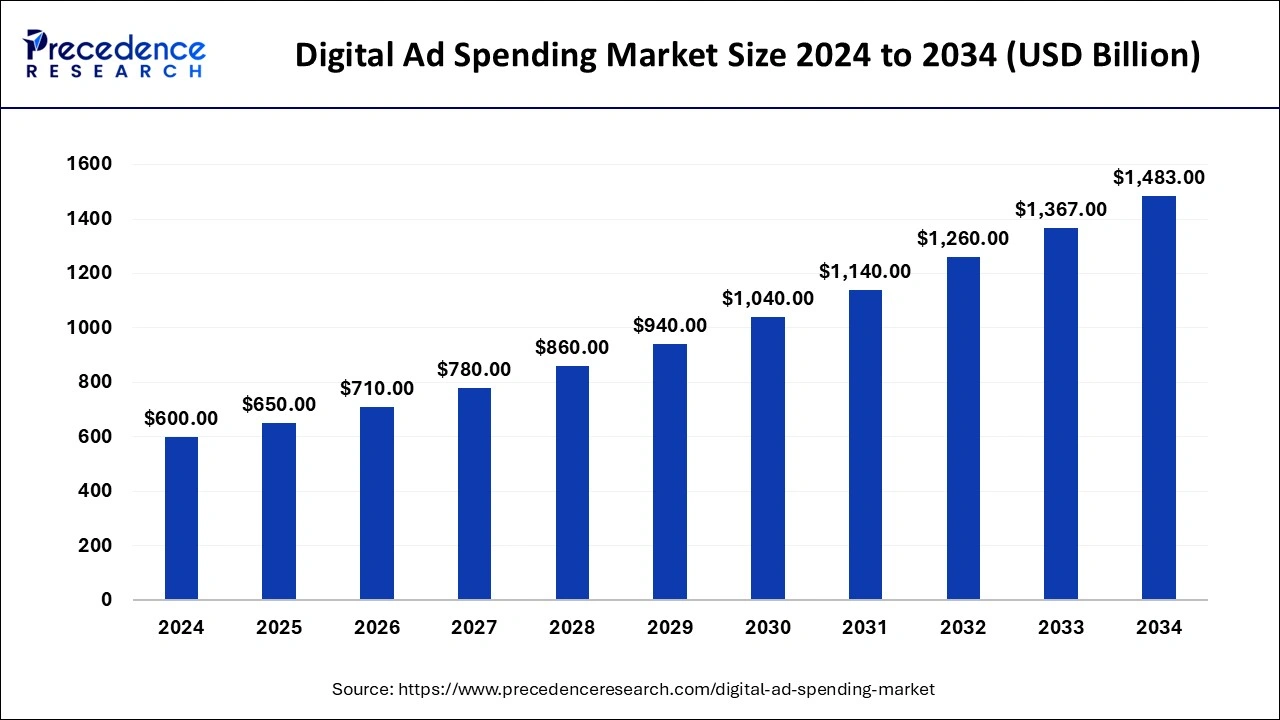
Google Ads alone accounts for over $280 billion a year. Facebook, now Meta, brings in more than $130 billion from ads. That is where businesses are putting their budgets, because the return is measurable.
And that is the part most people miss. Paid ads are not just about traffic. They are about return on investment. If a client gives you $1,000 to run ads, they want $2,000 or more back. If you can show them how to turn ad spend into revenue, you will never be short on work.
Let’s say you run a Google Ads campaign for a small e-commerce store. You test three types of ads, write focused copy, send users to a clean product page, and use conversion tracking to see what works.
After a month, sales go up by 40 percent. That store owner is not just happy, but they are now your long-term client. That is the power of knowing paid ads.
To sharpen your PPC skills, learn how to:
- Run and optimize campaigns on Google Ads and Meta Ads
- Write short, persuasive copy that drives clicks
- Choose the right audience and bidding strategy
- Monitor performance with Google Analytics or other tracking tools
- Adjust based on data, not guesses
- Report clearly so that clients and teams understand what is working
Good PPC marketers are not button-pushers. They are performance-driven. They know how to manage budgets, test creative ideas, and make data-based decisions. If you can help a business turn $1 into $3 consistently, your income will reflect that.
Companies are always willing to pay well for marketers who understand the paid side. Because when done right, it is not an expense but a money machine.
4. Affiliate Marketing Skills
Affiliate marketing isn’t just for influencers or bloggers, but a real skill set that businesses care about. If you know how to grow affiliate revenue, you understand how to sell without being pushy. That’s powerful. And profitable.
Affiliate marketing skills matter because they combine content strategy, audience building, copywriting, email, and data, all in one. You’re not just promoting links. You’re finding the right product, matching it with the right audience, and using the right message to get a sale.
Statista reports that affiliate marketing spending in the US is expected to reach over $16 billion by 2028. That’s because brands are doubling down on partnerships that deliver performance. No upfront costs, just results.
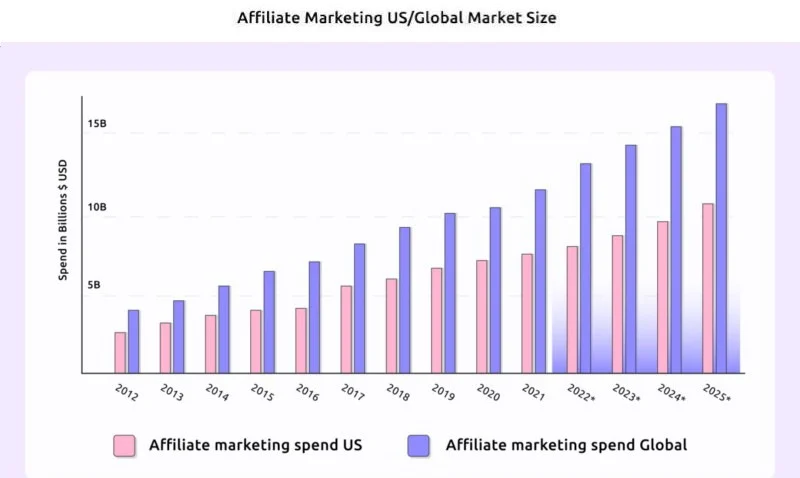
Good affiliates understand funnels. You might use a blog post to bring in organic traffic. Then a product review or a tutorial to warm up the lead. Follow that with a targeted email sequence or retargeting ad to close the sale. Every step is intentional.
Here’s what separates amateurs from pros. You don’t rely on luck. You know how to track performance, test offers, and write content that ranks or converts. That’s where the real money comes in.
If you want to get hired or build your own affiliate site, you need to show you can:
- Pick affiliate offers that match a niche and solve a real problem
- Write content that builds trust and drives action
- Use SEO and paid traffic to get eyes on your offers
- Set up email automations to follow up and increase conversions
- Read data and know what’s making money (and what’s not)
Affiliate marketing skills show you understand how to drive sales without a big budget. That’s rare. If you can build and manage affiliate partnerships or prove you’ve grown affiliate revenue, you’ll stand out in any marketing team.
And if you’re building something on your own, this is the one skill that can turn a side hustle into a full-time income. If you want to learn more about affiliate marketing, I recommend joining my 7-day free email course.
5. Email Marketing and Automation
Email is still one of the highest-performing marketing channels today. While everyone chases social trends, smart marketers know email brings consistent results, especially when combined with automation.
If you have strong email marketing skills, you become a huge asset to any business.
Building a list is just the start. The real skill is knowing how to turn subscribers into buyers. That means writing emails that people actually open, read, and act on. It means setting up sequences that do the work for you: welcoming new subscribers, warming them up, and guiding them toward a purchase.
Recommended Reading: How to Build a Strong Email List for Your Affiliate Marketing Business
According to Litmus, email marketing delivers an average return of $36 for every $1 spent. That beats paid ads, SEO, and almost every other channel. But you only get that return if you know what you’re doing.
The best email marketers understand how to:
- Build clean, engaged lists that actually want to hear from you
- Write subject lines that get clicks without sounding like spam
- Craft messages that build trust and solve real problems
- Create automated flows like welcome emails, product launches, cart recovery, or follow-ups
- Segment lists so each message feels personal and relevant
You don’t need to master every platform, but you should know how to use tools like Mailchimp, ActiveCampaign, or ConvertKit. These tools help set up automations, send broadcasts, tag users, and track results in real time.
If you can build and manage a simple three-email welcome sequence that turns a cold lead into a customer, that’s already more valuable than most marketers with fancy job titles.
Email marketing skills prove you understand relationship-building, timing, and direct response. That combination is rare. Businesses pay for it because they know email works, and they want someone who can make it work better.
6. Data Analytics and Marketing Metrics
If you don’t know what’s working, you’re just guessing. Data analytics skills for marketers are not optional anymore. They’re essential. Every digital marketing move creates data. Smart marketers use that data to make better decisions.
It’s not about becoming a data scientist. It’s about knowing how to read the numbers that matter. Which traffic sources bring the most leads? Which pages convert? Which campaigns are wasting money? If you can answer these, you’re already ahead of most.
Google Analytics, GA4, and Looker Studio (formerly Data Studio) are your starting points. These tools help you track behavior, spot trends, and build reports that show what’s actually going on.
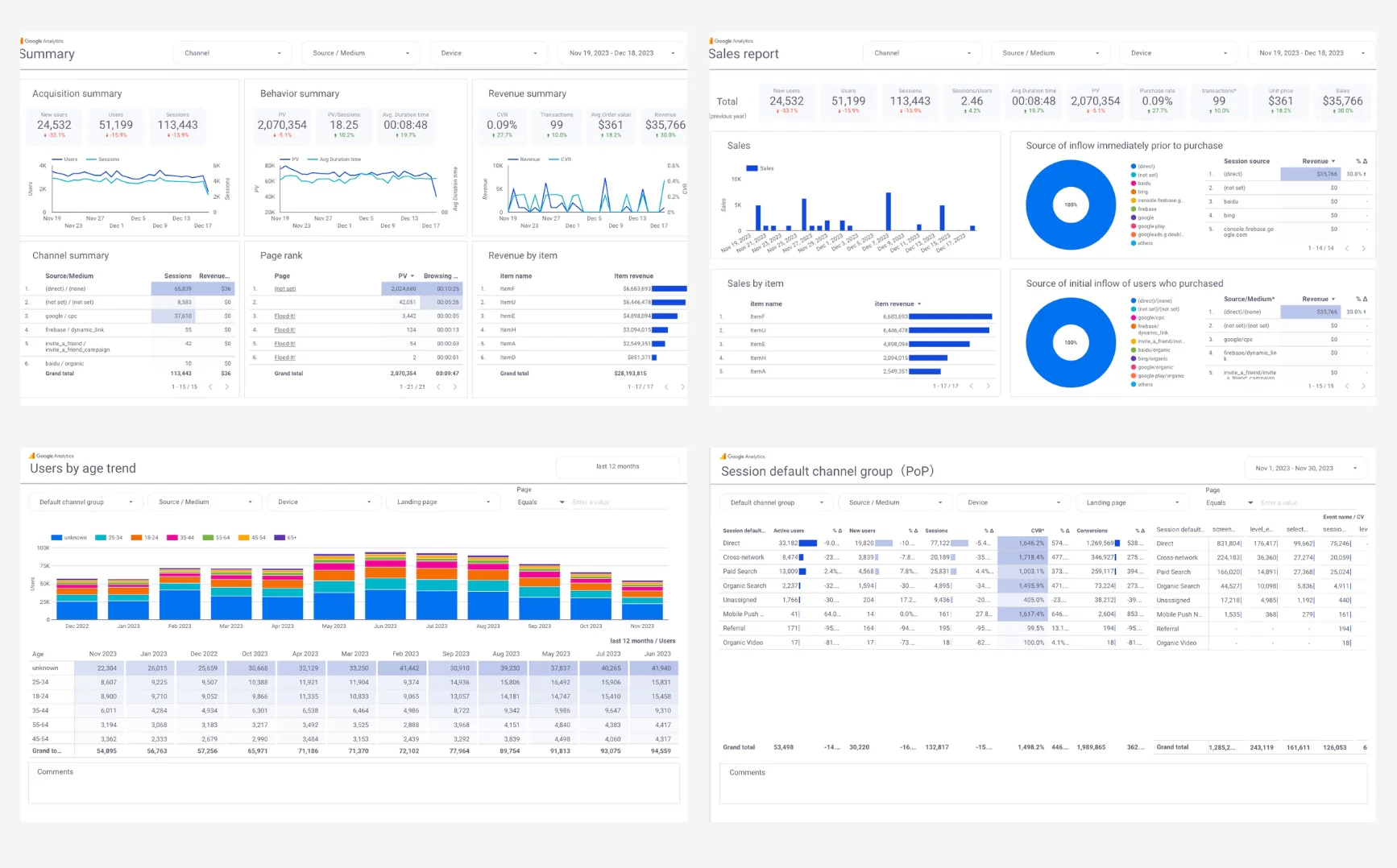
With GA4, for example, you can see where users came from, what they clicked, and how long they stayed. That insight helps you fix weak spots and double down on what works.
A marketer who understands metrics can do more than just run campaigns. They can improve them over time. That’s a huge advantage. Let’s say your client is running Facebook Ads to a landing page, but conversions are low.
You dig into the data and find that users are bouncing after 3 seconds. That tells you something’s off. Maybe the page speed, maybe the offer. Either way, you know where to look. And that’s what makes you valuable.
To build strong data analytics skills, learn how to:
- Use GA4 to monitor traffic and behavior
- Build dashboards in Looker Studio to show performance at a glance
- Track KPIs like conversion rate, bounce rate, and cost per lead
- Set up event tracking and custom goals
- Pull insights and turn them into clear, actionable steps
You don’t need to track everything. But you do need to track what matters. Clients and employers want marketers who don’t just guess but know. Data gives you proof. It lets you explain wins, spot problems, and test ideas with confidence.
In today’s market, data-driven marketers are in demand because they don’t just do the work, they improve it.
Bonus Skills That Give You an Edge
These are the advanced digital marketing skills that separate strong candidates from great ones. They are not always listed in job descriptions, but they show you think beyond the basics. If you want to stand out and earn more, these must-have digital marketing skills can give you the edge.
1. AI and Marketing Tools
AI won’t replace marketers, but marketers who use AI will replace those who don’t. Learning how to use AI tools like ChatGPT, Jasper, and Surfer SEO helps speed up content, research, and idea generation. It’s not about shortcuts. It’s about saving time and scaling smarter.
2. Copywriting That Converts
Every word counts. Whether it’s a headline, ad, email, or CTA. Writing that moves people to act is gold. Strong copywriting shows you understand your audience, your product, and how to connect the two. It’s one of the most valuable skills in digital marketing.
3. Video Editing and Content Creation
Video is no longer optional. From YouTube to TikTok to Instagram Reels, short and long-form videos drive attention and sales. Knowing how to shoot, cut, and polish video—even at a basic level—makes you more versatile. Tools like CapCut, Descript, or Premiere Pro are worth learning.
4. Conversion Rate Optimization (CRO)
Getting traffic is one thing. Turning that traffic into leads or sales is where the money is. CRO is about small changes that make a big difference. You test headlines, layouts, colors, and forms. You check heatmaps and user behavior. And you keep improving. Businesses love that mindset.
5. UX Basics
User experience is not just for designers. Marketers who understand UX can build better pages, write clearer copy, and improve flow. It’s about knowing how users think and making their journey smoother. That leads to higher conversions and lower bounce rates.
You don’t need to master all these at once. But if you can show even basic skills in two or three, you’ll be far ahead of most applicants. The more problems you can solve, the more valuable you become. And in digital marketing, value is what gets you paid.
How to Learn and Improve Your Digital Marketing Skills
Digital marketing changes fast. What worked last year might not work now. If you want to stay sharp and grow your income, you need to keep learning.
Here are a few real ways to improve digital marketing skills that actually matter.
1. Take Online Courses That Teach What Works
There’s no shortage of courses out there, but not all of them are worth your time. Stick to the ones that offer real strategies, not just theory.
Look for practical, step-by-step lessons you can apply right away. Platforms like Coursera, Skillshare, LinkedIn Learning, and Udemy are solid. Also, follow marketers who’ve done the work, not just talked about it.
2. Get Certified by Trusted Sources
Certifications aren’t everything, but they help. Google offers free certifications in Ads, Analytics, and more. HubSpot has strong programs in content and email marketing.
These can help you stand out, especially if you’re switching careers or freelancing. They also push you to learn the tools you’ll be using in real work.
3. Learn from Mentors or Join a Community
The fastest way to learn digital marketing skills is by asking questions and getting feedback from people ahead of you. Mentorship doesn’t have to be formal.
Join marketing groups on Reddit, Facebook, or Slack. Follow marketers on LinkedIn or Twitter. Watch what they share. Learn what they test. Pay attention to what they say and do.
4. Practice on Your Own Projects
Courses and certificates help, but nothing beats doing the work. Start a blog. Launch a simple funnel. Run a fifty dollar ad campaign. Real experience teaches you what no tutorial ever will. You’ll make mistakes and improve fast. That’s how skills stick.
5. Track Your Progress and Keep Adapting
Pick one skill to focus on at a time. SEO this month. Email marketing the next. Track what you’re learning. Set small goals and build layer by layer. Stay curious. Stay consistent. That’s what builds long term value.
If you want to get hired, promoted, or build something of your own, keep improving. Every new skill adds options and income potential.
Conclusion
Digital marketing is one of the few careers where skills matter more than degrees. If you know how to drive traffic, create content, analyze data, and convert leads, you’ll always be needed.
The five core skills plus the bonus ones are not just checkboxes. They’re income builders. Mastering even a few of them can open doors to better jobs, more freelance gigs, and higher pay.
Don’t wait for someone to hand you permission. Start learning. Pick one skill. Apply it. Improve it. Then move to the next.
You don’t need to know everything. You just need to be good at the right things.
Frequently Asked Questions
What are the best digital marketing skills to learn for a high-paying job?
The best digital marketing skills to learn right now include SEO, content marketing, paid ads, email marketing, and data analytics. These are in demand across industries. Employers want people who can drive real results, not just talk strategy. Upskilling in these areas gives you more control over your income and job security. If you’re just starting out, focus on one skill first—like SEO or content creation—then build from there. Certifications, hands-on practice, and mentorship can help you grow faster.
How can I improve my digital marketing skills without a degree?
You don’t need a degree to succeed in marketing today. You just need the right skills and experience. To improve digital marketing skills, take online courses, earn certifications from Google or HubSpot, and work on real projects. Launch your own blog. Run test ads. Track results. The more you do, the faster you learn. Join communities, follow marketers who share what works, and stay curious. Experience will always beat theory in this space.
What are the most in-demand digital marketing skills in 2025?
In 2025, the most in-demand digital marketing skills include SEO, data analytics, content marketing, paid ads (PPC), and email marketing. Employers are looking for marketers who can work across channels and bring measurable growth. Skills in AI, conversion rate optimization, video editing, and UX also give you a strong edge. Knowing how to blend strategy with tools like GA4, Google Ads, and automation platforms makes you a top hire.
How long does it take to learn digital marketing skills?
It depends on how deep you go, but most people can learn digital marketing skills in 3 to 6 months if they stay consistent. You can master the basics of SEO, email marketing, or PPC with focused study and hands-on work. The key is applying what you learn. Courses and books help, but real growth comes from launching your own campaigns and testing things out. Build as you learn. That’s how it sticks.
Can I learn digital marketing skills online and get hired?
Yes. Many marketers today are self-taught and earning well. If you learn digital marketing skills through online courses, get certified, and build a small portfolio—you can get hired. Employers care more about results than resumes. If you can show what you’ve done, even on your own website or social pages, you’re in a strong position. Focus on solving real business problems and proving it with data. That’s what hiring managers look for.


